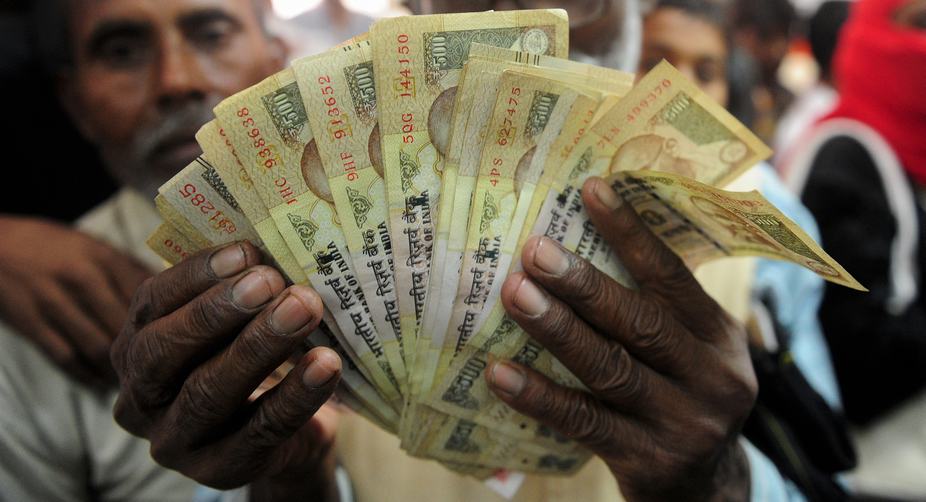Frantic crowds have started besieging banks and shops at Nepal-India border points like Sunauli and Nautanwa to exchange their 500- and 1,000-rupee Indian banknotes, terrified that they were going to become worthless.
Frantic crowds have started besieging banks and shops at Nepal-India border points like Sunauli and Nautanwa to exchange their 500- and 1,000-rupee Indian banknotes, terrified that they were going to become worthless.
These large denomination bills were pulled out of circulation by the Indian government on Tuesday.
Hari Om Sherwani, proprietor of Hari Om General Stores at Sunauli, said that he had been mobbed by people wanting to exchange Indian currency from early in the morning on Thursday. “However, we have not been able to accept the banknotes,” he said. Panic spread among the people living in the border areas after Nepal Rastra Bank (NRB) refused to accept the banned currency notes.
Gopal Bhandari, president of the Lumbini Money Changer Association, said he had been forced to close his outlet as the central bank had stopped accepting the banknotes. “We don’t have any option but to keep our stores closed,” he said.
Indian Prime Minister Narendra Modi announced on Tuesday that 500- and 1,000-rupee notes would be withdrawn from circulation effective Tuesday midnight “to crack down on rampant corruption and counterfeit currency.” Following the Indian government’s surprise decision, NRB also banned the use of these banknotes in Nepal from Wednesday.
The Indian government has given a 50-day deadline to deposit the scrapped notes at banks and post offices. It said people who have accounts with Indian banks need not worry as they will exchange the banknotes. But a large number of Nepalis holding the banned notes do not have accounts with Indian banks. For this reason, many people have been approaching retired Indian Army personnel as many of them have accounts with Indian banks. Some have reportedly been offering 200 Nepalese rupee extra per 1,000 Indian rupees to exchange the banknotes.
Rewati Prasad Nepal, director of the NRB branch office in Bhairahawa, said the central bank should immediately initiate talks with the Reserve Bank of India (RBI) and make arrangements to collect all the banned notes in the possession of Nepalis.
On Wednesday, NRB had written to the RBI to provide time to Nepalis holding the abolished bills to exchange them for legal bills in the country.
NRB said that there were around IRs35 million worth of 500- and 1,000-rupee notes in Nepal’s formal financial system. The estimate is based on figures provided by banks, financial institutions and money changers and cash in NRB’s possession.
Prior to the ban, Nepali travellers were allowed to carry Rs.500 and Rs.1,000 banknotes worth up to Rs.25,000 on their person. Therefore, the stock of banned bills may well exceed Rs.35 million, an NRB official said.
Also, border residents usually keep large amounts of Indian notes of larger denominations as they have to frequent Indian markets to buy goods.
‘Raise Issue at Political Level’
Former finance ministers have urged the government to reach out to the top brass of the Indian government to resolve problems faced by Nepalis possessing Indian banknotes of 500 and 1,000 denominations that have been pulled out of circulation.
Former finance minister and senior Nepali Congress of Ram Sharan Mahat said the Indian government’s decision to demonetise 500- and 1,000-rupee notes was political, so Nepal should raise the issue at the political level.
He said he has learnt the governor of the Indian central bank has replied to Nepal Rastra Bank stating nothing can be done on this issue at his level. “In such a situation, it is necessary for our prime minister or finance minister to talk to their counterparts directly,” Mahat told Friday’s meeting of the Legislature-Parliament.
Following the Indian government’s surprise decision, Nepal Rastra Bank also banned the use of the banknotes in Nepal from Wednesday.
Prior to the ban, Nepali citizens were allowed to hold Indian bank notes of 500 and 1,000 denominations worth up to Rs.25,000.
Former finance minister and senior leader of the CPN-UML Surendra Pandey said it becomes the duty of the government to ensure the banned notes in possession of Nepalis are exchanged because the government had allowed them to carry those bills.
(The Kathmandu Post/ANN)
